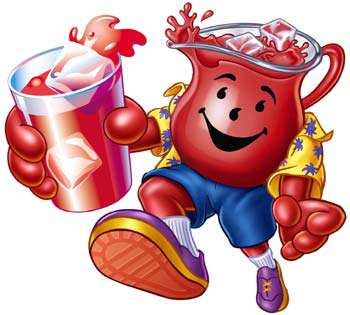Trader Mark’s thoughts on the economy, Kool Aid, Japan and second half recovery (albeit in the sarcasm font).
Bloomberg Forgot to Drink their Kool Aid
This is a decidedly anti-Kool Aid message from Bloomberg, which unfortunately intertwines with a lot of my "longer term" thoughts… as we move from "credit crisis panic" to "denial of recession possibility" to what comes out the other side. Again, we are an asset based, credit expansion economy – less and less of us "make things". So until our assets start reinflating (the biggest of which is our homes) we cannot once again repeat the credit orgy we just exited from. Or we could continue to go hat in hand to the Middle East and Asia where we send all our cash in return for goods/natural resources we need, and ask them to finance us even further then they already do (mostly with our own money of course). Maybe we can have telethons in Middle Eastern countries – "Adopt an American" – you know fund raisers to help us spend over and above our means… or as Hillary would say: It takes a village of Saudi oilmen to raise a bloated debt ridden American. 😉
- A normal U.S. economy is likely to look a lot different, and worse, after the credit crisis is over and financial markets settle down.
- Companies will continue to struggle to raise cash for expansion and innovation as investors and lenders remain focused on conserving capital.
- Workers, too, may have less flexibility to go after new opportunities, because many will be stuck where they are — in homes worth less than the balances on their mortgages.
- “Once you’ve made terrible, overly optimistic errors, that paralyzes you for some time,” says economist Paul Samuelson, a Nobel laureate.
- The bottom line: The U.S. may have to get used to a new definition of normal, characterized by weaker productivity gains, slower economic growth, higher unemployment and a diminished financial-services industry.
- Long-term growth in the U.S. may drop to 2 percent to 2.5 percent a year from the 3 percent rate of the last 15 years (not if the government reporting machine has anything to do with it! I’m looking for 5,6, dare I say 7%! By the 2nd half? Ok ok that’s amibitous – let’s be content with 2009)
- Even after markets recover, “the cost of risk capital is likely to be significantly higher than during the credit bubble,” he says. (not if you print new capital out of DC printing presses at a rate of 1:5?)
- Less risk-taking can mean a less-vibrant economy, says Samuelson, 93, an emeritus professor at the Massachusetts Institute of Technology in Cambridge, Massachusetts. “What you could lose are some new ideas that would otherwise get to be practical and get their chance,” he says.
- Workers too are feeling the fallout from the credit crisis. The share of respondents in a May 1-8 Bloomberg/Los Angeles Times poll who described themselves as financially secure fell to the lowest level since 1992.
- The depressed housing market may keep some workers from pulling up stakes to pursue new employment. “Many times, job candidates are willing to talk to you about an opening,” says Sally Stetson, co-founder of Salveson Stetson Group, an executive-search firm in Radnor, Pennsylvania. “But then reality sets in as they look at their home price and they pull back.”
But don’t worry, a Japan style situation could never happen here. Because we could never have an overinflated stock market that crashed and burned, and then essentially went sideways for a decade [Mar 26: Stocks Tarnished by a Lost Decade] That could never happen here. Nor….unlike them, would we ever have a situation of nationwide housing price deflation after yet another bubble. Nope. Never. [Jan 24: They Said it Could Never Happen. Ever. They Lied] Nor would we have government regulators looking the other way as banks went unchecked or hid liabilities, and now refuse to admit them, dripping and dropping losses out at a methodical rate so as to not reveal the truth. Nope, only in Japan would such things happen. We are too good for that. Never here. Nope.
Well at least we, unlike Japan, are welcoming immigrants here to help drive the economy & create growth. What’s that? Oh… um… well… um… well we still have better football players than Japan. So take that! How clear can I make it that we are not at all like Japan!
And send those 2 Bloomberg writers some Kool Aid. Sheesh, what a downer – they are missing the 2nd half recovery for the forest.
Conclusion: Buy stocks. It’s all priced in. And we are nothing like Japan.
Next Up?? This complex in Mitaka, Tokoyo has been designed with only one purpose in mind: to keep octogenarians constantly alert within the confines of their own Electric Kool Aid apartment.



